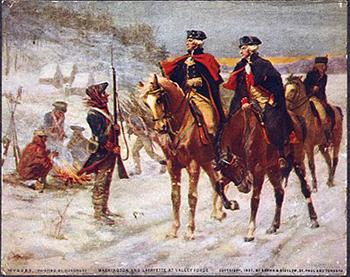
This has already been a winter for the record books. According to a CNN meteorologist, temperatures on New Year's Day were below freezing across 90 percent of the United States. Then came the extended arctic storm blasting the Midwest and Northeast, and snow even in Florida! And we aren't even halfway through January.
Before feeling too sorry for yourself, though, think of what faced America's first national army-the Continental Army-at Valley Forge in the winter of 1777-78. That is a real lesson in the meaning of true patriotism. We don't have temperatures to compare, but we do know from eye-witness accounts that it was a bitter winter and conditions were dire for our soldiers fighting for American independence.
General George Washington had many critics as winter descended upon the land, after defeats in a string of major battles against the larger, more rigorously trained, and better equipped British and Hessian forces. The redcoats had captured the American capital, Philadelphia, where they had warm living quarters in confiscated colonial homes and plenty of food as they settled down for the winter months. Given the technology of that era, fighting was limited during the worst weather. But Washington wanted to make certain they didn't pursue raids into the Pennsylvania hinterland, so he pitched camp about 20 miles outside of Philadelphia, at Valley Forge. That location was close enough to keep watch on the Brits, while elevated enough to avoid surprise attacks, and it afforded a plentiful supply of water from the Schuylkill River.
Living conditions were far different, however, in the countryside of Valley Forge. Two thousand log huts had to be constructed to house the troops, usually 12 men to a small hut, with straw as bedding. Clothing was woefully inadequate for winter conditions. After long marches, only a quarter of the troops had shoes, the rest walking with bandages around their feet. (It was said you could follow the trail of the Continental Army by the blood stains on the ground.) Blankets were scarce. There was barely enough food to survive, with most men eating a tasteless mixture of flour and water. Their Christmas Eve meal consisted of rice and vinegar.
During their stay at Valley Forge, 2,500 of Washington's 12,000 men died of diseases-typhus, typhoid, smallpox, dysentery, and pneumonia-as well as from malnutrition and exposure to the snow and freezing temperatures. Seven hundred horses also died.
These conditions are almost unimaginable to us today. Today's troops often face great difficulties, but we expect that they will be well fed and clothed. The Continental Congress finally started providing money for these basic necessities by the end of February, after three horrendous months.
It is a tribute to the patriotism and unquenchable thirst for liberty of our first national army that they emerged from Valley Forge stronger and more determined to carry on the fight until victory was assured at Yorktown in October 1781. We can thank the unfaltering leadership of George Washington, who could have lived in comfort away from the camp but chose to remain with his troops; Prussian Baron Friedrich Wilhelm von Steuben, who implemented an effective training program for the troops for the first time; and the French alliance with America in May 1778. But most of all it was the grunts-the common soldiers-who deserve our respect.
And let us not forget the greatest pamphleteer of the American Revolution, Tom Paine. His essay, The American Crisis, or The Crisis, opened with what may be the most memorable words written on behalf of the American cause:
"These are the times that try men's souls. The summer soldier and the sunshine patriot will, in this crisis, shrink from the service of their country, but he that stands it now, deserves the love and thanks of man and woman. Tyranny, like hell, is not easily conquered; yet we have this consolation with us, that the harder the conflict, the more glorious the triumph. What we obtain too cheap, we esteem too lightly; it is dearness only that gives everything its value. Heaven knows how to put a proper price on its goods; and it would be strange indeed if so celestial an article as Freedom should not be highly rated. Britain, with an army to enforce its tyranny, has declared that she has a right [not only to tax] but "to bind us in all cases whatsoever," and if being bound in that manner is not slavery, then is there not such a thing as slavery upon earth. Even the expression is impious; for so unlimited a power can only belong to God."
General Washington read these words aloud to his troops before they attacked the Hessians in Trenton, successfully. It was said that Paine's words were then read aloud in every American military encampment. "Militiamen who, already tired of the war, were straggling from the army, returned," wrote contemporary James Cheetham. "Hope succeeded to despair, cheerfulness to gloom, and firmness to irresolution."
So, my fellow Americans-yes, we are FedUp Americans struggling against the tyranny that has replaced the British in Washington, D.C., and we may be having some difficulties seeking to remain warm during this harsh winter. But let's not be summer soldiers and sunshine patriots, and complain too much. Let us use this winter and its difficulties to remember those who fought under much worse conditions, often giving their lives, to create the nation we work to preserve today.
Sincerely, ![]()
Richard A. Viguerie
Chairman, FedUp PAC